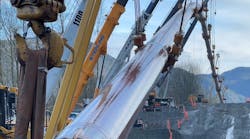By the OGJ Online Staff
HOUSTON, Mar. 26�A unit of Williams, Tulsa, announced an expansion project on its Kern River pipeline that will cost more than $1 billion and will more than double the amount of natural gas transported on the 926-mile pipeline system.
The project will provide 900 MMcfd of additional transportation capacity from Wyoming to California by May 2003. Last November, Williams held an open season to determine interest from shippers for additional transportation capacity from Rocky Mountain basins to markets in Utah, Nevada, and California.
Kirk Morgan, Kern River director of business development, said, �There is a tremendous demand for natural gas to fuel new electric generation facilities."
The project will loop 700 miles of the existing Kern River system. Williams plans to apply with the Federal Energy Regulatory Commission in June. The project remains subject to environmental and regulatory approvals.
Previously, Williams filed a California Emergency Action application with FERC to install and operate emergency facilities on Kern River to increase capacity by 19%. That $81 million emergency expansion would add 135 MMcfd of firm transportation service into California by July 1 to help meet energy demand this summer.
In November of 2000, Williams filed a FERC application for its first expansion on Kern River, the 2002 California Expansion Project. The proposed $80 million expansion, slated for completed by May 2002, would install compression to provide an additional 124 MMcfd of firm transportation service.
Williams� gas pipeline unit is based in Houston and has offices in Salt Lake City, Utah, and Owensboro, Ky. Its five interstate natural gas pipelines deliver 16% of the gas consumed in the US.

